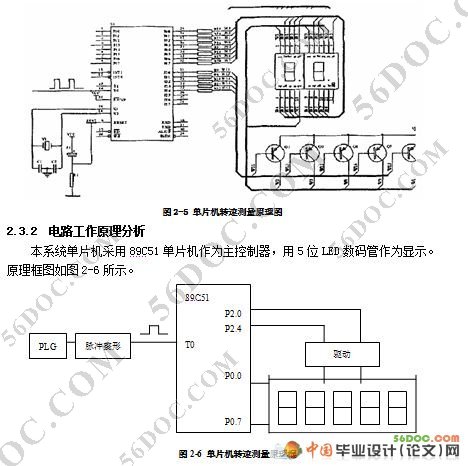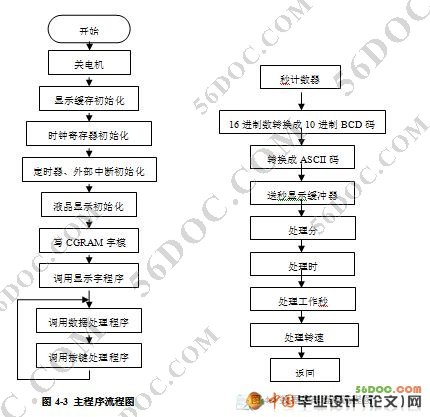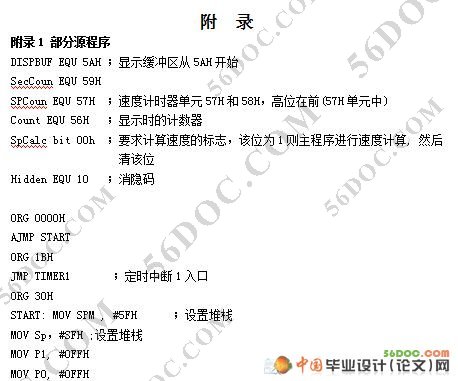单片机多用宽频转速计的设计
无需注册登录,支付后按照提示操作即可获取该资料.
摘 要
本文首先叙述了单片机转速测量系统的构成及转速测量的方法,然后针对特定的应用环境,给出了系统中各硬件模块设计方法及系统软件设计方法和部分源程序流程图和程序清单,设计了一种基于89C51单片机的转速计,详细阐述了系统的工作原理,分析其工作流程。首先确定定时器的工作方式,方式控制字,确定串行口的工作模式等,然后进行程序设计, 本设计软件分为主程序、数据处理程序、按键与修改程序设计、中断服务子程序、LED显示程序五个部分。该转速系统安装维护方便,工作稳定,运行可靠,具有较大的推广应用价值。
关键词:单片机;频率测量;数据处理;转速计;传感器
Abstract
This paper describes the first single-chip speed measurement system composition and the method of speed measurement,and then the application-specific environment,The system is given the modular design of the hardware and system software design methods and flow charts and procedures part of the list of source。A microcontroller-based tachometer 89C51,Described in detail the working principle, analysis of its workflow。First , is to determine the timer’s ways of working , control word , determine the work of serial port models , and then is to design the program. The software design is divided into five parts ,they are Main program, data processing procedures, keys and modify the program design, interrupt service routines, LED display program. The speed of the system to facilitate installation and maintenance, work stability, reliable operation and the promotion of greater value.
Keywords: Single-chip Computer;Frequency Measurement ;Data Processing ;Tachomete ;sensor
课题研究的目的和意义
转速是过程中应用非常广泛的一个参数,其测量方法较多,而模拟量的采集和模拟处理一直是转速测量的主要方法,这种测量方法已不能适应现代科技发展的要求,在测量范围和测量精度上,已不能满足大多数系统的使用。随着大规模及超大规模集成电路技术的发展,数字系统测量得到普遍应用,特别是单片机对脉冲数字信号的强大处理功能,使得全数字测量系统越来越普及,其转速测量系统也可以用全数字化处理。在测量范围和测量精度方面都有极大的提高。因此,本课题的目的是,利用89C51单片机设计一种转速计,并从实际硬件电路出发,分析电路工作原理和软件流程。
课题以单片机为中心,设计的单片机多用宽频转速计,在工业控制和民用电器中都有较高使用价值。
本课题主要研究内容
1. 分析转速测量原理
2. 根据单片机系统的设计原则,提出测量方案,构建硬件系统,分别对硬件系统的
配置予以估计,使其能够对转速进行测量,同时分析接口电路,显示转速。
3. 对单片机定时/计数器进行设置。
4. 根据系统要求设置各控制字,编制程序,包括主程序流、显示中断流程等。



目录 13000字
摘 要 I
Abstract II
第1章 绪论 1
1.1 课题研究的背景 1
1.2 国内外研究现状综述 1
1.3 课题研究的目的和意义 4
1.4 本课题主要研究内容 4
第2章 基于单片机的转速测量原理 4
2.1 测量系统的构成 4
2.2 转速测量原理 6
2.3 转速测量电路设计 8
第3章 单片机多用宽频转速计的硬件结构设计 11
3.1 键盘显示模块设计 11
3.2 89C51单片机介绍 11
第4章 单片机多用宽频转速计的软件设计 11
4.1 工作方式及控制字设置 11
4.2 软件设计 16
结论 21
参考文献 22
附 录 23
致 谢 27
